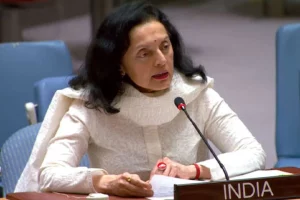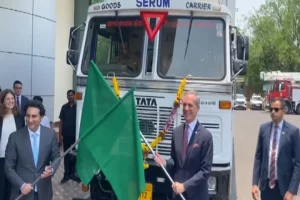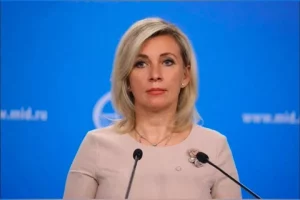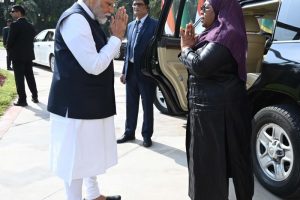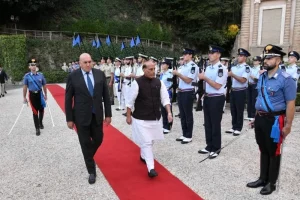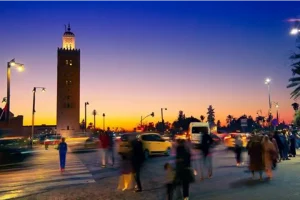As hostilities continue to increase in Sudan, India has once again “sincerely requested” all its citizens in the Northeast African country to stay put where they are and not venture outside.
“We have come across many instances of looting. All Indian nationals are advised please not to venture out. Please ration your supplies. The situation may continue for a few more days. Please try to take help from your neighbours. Please stay at home and remain safe,” tweeted the Embassy of India in Khartoum Tuesday afternoon.
The dramatic events taking place in Sudan are causing serious concern in New Delhi where a control room has been set up at the Ministry of External Affairs (MEA) to provide information and assistance.
On April 16, a day after armed clashes took place in Khartoum between units of the Sudanese army and the Rapid Reaction Forces, the Indian Embassy reported that Albert Augestine, an Indian national working in a Dal Group company in Sudan, got hit by a stray bullet and has succumbed to his injuries.
Fighting continues
😢😢😢😢#Khartoum #sudan pic.twitter.com/9kHUk4lAaD— ibn Muhammad Haroun (@muhammad_breezy) April 16, 2023
As it continued to operate under heightened security measures, while remaining in touch with the family of the deceased and medical authorities to make further arrangements the same time, the Embassy continued to issue advisories to Indian nationals to stay calm and peaceful.
“Stay away from open spaces like balconies or terraces. Keep essentials – medicine, water, money, passport, OCI card food ready with you to ensure easy mobility, when feasible,” it advised, also asking Indians planning to travel to Sudan to postpone their travel.
In view of the current situation in Sudan, a Control Room has been set up at @MEAIndia to provide information and assistance.
Coordinates of the Control Room⬇️ pic.twitter.com/wRVxxxbtdz
— Arindam Bagchi (@MEAIndia) April 17, 2023
Military operations using heavy equipment are taking place in the area of the Republican Palace, the main command of the Armed Forces of the Republic of Sudan, the airport, the central market, as well as near military bases in the south of the Sudanese capital.
The international airport is temporarily closed, and bridges over the Nile River are blocked. An escalation in tension is also reported in the city of Meroe, 500 km north of Khartoum.
The dramatic events involving General Abdel Fattah Abdelrahman al-Burhan from the Sudanese army and General Mohamed Hamdan Degalo of the Rapid Reaction Forces have pushed back efforts to restore Sudan’s democratic transition.
A friend in Khartoum sent this, recorded a little earlier. Gives a sense of the clashes and how terrifying it must be right now. #Sudan pic.twitter.com/42sI6N5avf
— James Copnall (@JamesCopnall) April 15, 2023
Geographically located at the crossroads of Sub-Saharan Africa and the Arab world, Sudan shares borders with seven countries with the River Nile traversing the country from south to north, making the country a sea bridge between Africa and the Middle East.
It is estimated that, out of about 4,000 Indians in Sudan, around 1200 have now been settled for about 150 years. According to the Indian Embassy, the first Indian Luvchand Amarchand Shah, a Gujarati trader who imported goods from India, is believed to have come to Sudan from Aden in 1856. When his business expanded, he brought his relatives from Saurashtra, who in turn invited their own friends and family.
As the Indian community gradually grew and developed, it moved from the small towns in the eastern part of the country, including Port Sudan and Sawakin, to the interiors and settled down in Omdurman, Kassala, Gedaref and Wad Medani.
A number of Indian companies have a presence in Sudan in different fields such as pharmaceuticals, agriculture, mining, energy services, etc. Indian experts and workers are also present in different sectors like IT, pharmaceutical, sugar, steel industry, ceramic industry, etc., and are making a significant contribution. Several steel units owned by PIOs such as Liberty Steel, Omega Steel and Aarti Steel, which is a subsidiary of Bhushan Group, have also a significant presence in the country.
ONGC Videsh Limited had invested USD 2.3 billion in the oil industry in undivided Sudan by acquisition through OVL of 25% shares of Talisman Energy Inc. of Canada in the Greater Nile Petroleum Operating Company consortium in early 2000.
Met with HE Mr. Ezekiel Lol Gatkouth, Min. of Petroleum, South Sudan on the sidelines of @Petrotech2019. HE Mr. Ezekiel Lol Gatkouth complimented the role of Indian E&P Companies specially @ONGC in augmenting South Sudan’s energy initiatives. pic.twitter.com/cjazXaGb47
— Dharmendra Pradhan (@dpradhanbjp) February 10, 2019
Kosti Thermal Power Plant built by BHEL in Sudan under India’s Line of Credit of US$ 350 million is the largest thermal power plant in the country and the biggest combined cycle project built by BHEL in Africa.







